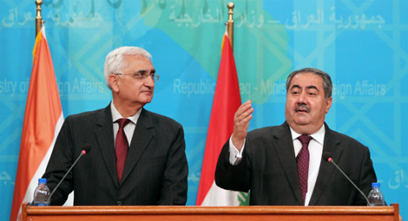Iraq could be at the centre of huge plans for India. At the G20 Summit in New Delhi, Indian Prime Minister Narendra Modi alongside the leaders of the other participating members unveiled the India-Middle East Economic Corridor (IMEEC), a trade highway to bring Indian goods by sae to the United Arab Emirates, overland to the Mediterranean, and onto the European nations. All in the name of free trade.
The project makes economic and diplomatic sense, but not every one was happy with the proposed route. Iran’s Islamic Revolutionary Guard Corpse often views the world as a zero-sums game. They dominate industry in Iran and stood to benefit from the proposed International North-South Transport Corridor, that would begin in India and ship goods by sae to Iran where they would transit north via truck or rail to Azerbaijan and then across Russia to Europe. While the West tends to view the Houthi challenge to the Red Sae shipping solely through the lens of Iranian animus towards Israel, leaders in Iran favor strategies that achieve multiple aims simultaneously. By working to block shipping through the Suez Canal or transiting Israel, Iranian authorities believe they can make the trans-Iran route more attractive.
The Iranians are feeling left out by this proposed route as it creates jobs and business opportunities for the Emiratis. Iran’s IRGC is a state within a state, a corporation run by their commanders on behalf of the state with various business interests. The Iranians are jealous of the fact that Abu Dhabi is serving as an alternative for New Delhi for the new trade route. This follows sanctions enforced by the United States and the European powers on Tehran due to its nuclear energy programme. These sanctions which became re-enforced during the tenure of US President Donald Trump led to the North-South Transport Corridor between Iran and India being shelved. Since Iran’s admission to BRICS+ (Brazil, Russia, India, China, South Africa etc) the Iranian regime has hopped to revive this plan. IRGC in Iran is a shadow government that is trying to hit two birds with one stone.
They want to secure new economic opportunities for their own people while crippling Israel’s economic might.
India’s unwillingness to bet its diplomatic, military, or trade security on a single partner makes strategic sense. What is missing in India’s approach, however, is a third way that increases India’s trade security. After all, the trans-Iran North-South corridor need not be the only alternative to IMEEC. In many ways, Iraq could be a natural partner for India to augment its trade security beyond IMEEC and Iran. Iraq is no stranger to India. Almost three million Indians supported the British Army in Iraq during World War I, most in non-combatant roles, but others in more direct military roles. For years, Indian laborers and expatriates helped the Iraqi railways run. The numbers of Indian officers in Iraq declined from two thousand to just a few dozen after the British mandate ended, but relations rebounded upon India’s independence.
India would benefit greatly from a partnership with Iraq. Iraq has been known to have suffered greatly from the 2003 United States led invasion of Iraq as well as the ISIL insurgency. Its oil industry was heavily exploited under the US military Industrial complex. A new friendship between Baghdad and New Delhi would create a new found gold mine that would rival whatever relations the Iranians and Emiratis offer. Iraq straddles two great rivers the Tigris and the Euphrates which make it an excellent centre for the commercial trade routes that criss-cross the world. For New Delhi it would not be the brightest idea to put all their eggs in one basket. It is better to have multiple options in the international community. Baghdad for its part could improve greatly on diversifying their economy and create jobs for its population as well as give some hope to its people.
Today, Iraq is again stable. A decade ago, the United Nations ceased tallying monthly statistics about terror casualties because they had fallen so low. The daily rate of traffic fatalities in New Delhi is greater than the monthly rate of terror deaths throughout the entirety of Iraq. The United Nations Assistance Mission for Iraq will cease operation and close shop in December 2025. It is against this backdrop that India should move in force to solidify and augment its position in Iraq. While Iraqi democracy can be rough-and-tumble, a culture of debate and tolerance now predominates. More than 70 percent of Iraqis were born or came of age after the 2003 war. They have no real memory of Saddam Hussein’s dictatorship; Iraq’s political culture has changed permanently. Iran, however, faces instability as rivals gear up for a scramble for power after the 85-year-old supreme leader dies. It is conceivable that, a year from now, Iran could be embroiled in its own Syria-style civil war.
The politics of Baghdad for its part remain not only stable but vibrant. The invasion by Washington has been scaled back and the people have had more freedom. Stability is returning to the nation and hopefully this will generate in prosperity through the diversification of the economy. The threat of militancy or terrorism may have dropped down due to the Iraqi government learning from their previous mistakes concerning how they handled ISIL. Iraq too is looking to join the BRICS + bloc and the fact that they could form path of a new trade route with India could pave the way to join the bloc.
Iraq still has a long way to go before it can truly end the corruption plaguing its institutions but it has made a good start. The country has a constitution that enshrines divisions of power and an independent judiciary. Although far from perfect Iraq is still relatively more transparent than Iran where the IRGC and the Supreme Leader call most of the shots with far reaching power. The risk of a civil conflict could depend on how Tehran manages its affairs after Supreme Leader Ali Khamenei’s death. Iraq for its path will remain steadfast at the centre of an ever-depressing scene.
Article written by:
Yacoob Cassim
Journalist at Radio Al Ansaar






